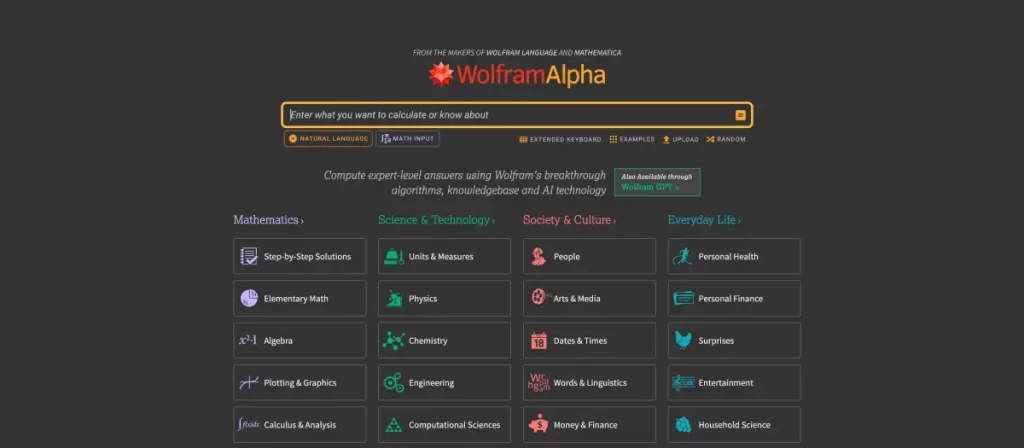A search engine is an online tool that enables users to find information on the Internet by typing in keywords or queries. These systems index billions of web pages and use complex algorithms to deliver the most relevant results based on the user’s query.
List of the most popular search engines
1. Google

Google remains the undisputed leader among search engines, with the largest market share worldwide. Founded in 1998 by Larry Page and Sergey Brin, Google is known for its algorithms algorithms such as PageRankwhich evaluate the relevance of web pages. The search engine offers advanced features such as voice search, instant answers and tight integration with other Google services such as Google Maps, Google Images and YouTube. The personalization of search results and the continuous improvement of its algorithms enable Google to maintain its dominant position.
2. Bing

Developed by Microsoft, Bing is the second most widely used search engine. Launched in 2009 as the successor to MSN Search and Windows Live Search, Bing stands out for its visual features such as background images and video previews. Bing also offers direct answers and integrations with Microsoft services such as Office and Cortana. Its visual search capabilities and rewards via the Microsoft Rewards program make it an attractive alternative to Google.
3. Yahoo

Although not as popular as it once was, Yahoo remains an important player thanks to its partnership with Bing for search results and its large, loyal user base. Yahoo Search offers unique features such as local results, instant answers and customizable search filters. Yahoo continues to attract users with its other services such as Yahoo Mail, Yahoo Finance and Yahoo News, integrating search and news content.
4. Ask.com

Ask.com, originally known asAsk Jeeves, is famous for its question-and-answer format. Founded in 1996, it enables users to ask questions in natural language and obtain direct answers. Ask.com combines traditional search results with answers extracted from its database and third-party sources, making it useful for specific questions and educational research.
5. AOL.com

AOL.com continues to maintain a presence in the world of search engines, although its usage is mainly linked to its messaging services and multimedia content. A former Internet giant in the 90s, AOL still offers search services integrated with its web portal, which includes news, entertainment and messaging services such as AOL Mail.
6. Baidu

China’s leading search engine, Baidu dominates the Chinese market thanks to its ability to index content in Mandarin and its many integrated services, including mapping, music and forums. Founded in 2000 by Robin Li and Eric Xu, Baidu is often referred to as “China’s Google”, and also offers advanced voice recognition and artificial intelligence services, tailored to the specific needs of the Chinese market.
7. Wolframalpha

Wolframalpha stands out for its computational approach, providing precise answers based on calculations and structured data rather than web page results. Launched in 2009 by Stephen Wolfram, this search engine is particularly useful for academic, scientific and technical research. It can solve complex equations, provide data analysis and offer detailed factual answers.
8. DuckDuckGo

Renowned for its respect for privacy, DuckDuckGo does not collect or share users’ personal information, offering a secure alternative to traditional search engines. Founded in 2008 by Gabriel Weinberg, DuckDuckGo blocks ad trackers and offers non-personalized search results. Its commitment to confidentiality is attracting more and more users concerned about their online privacy.
9. Web Archives

Web Archives, also known as the Wayback Machine, enables users to search for archived versions of web pages, a valuable tool for researchers and historians wishing to access older content. Founded by theInternet Archive in 1996, this search engine indexes billions of archived web pages, offering a comprehensive view of the evolution of the Internet over the years.
10. Yandex.ru

The leader on the Russian market, Yandex.ru offers a wide range of services, including search, mapping and e-mail, tailored to the specific needs of Russian-speaking users. Founded in 1997, Yandex is often compared to Google in Russia, with a strong presence in local services such as Yandex Taxi, Yandex Music and Yandex Market. Its search algorithms are optimized for the Russian language and culture, making it the preferred choice for users in Russia.
What about other search engines?
Qwant

Qwant is a French search engine that focuses on protecting users’ privacy. It does not track users or filter search results according to individual profiles. Qwant is particularly appreciated for its neutrality and respect for privacy.
Ecosia

Ecosia is an ecological search engine based in Germany. It uses the revenues generated by searches to fund reforestation projects around the world. For every search performed, Ecosia plants trees, offering a sustainable and ecological alternative to traditional search engines.
StartPage

StartPage combines Google results with strong privacy protection. Based in the Netherlands, this search engine guarantees anonymity by storing no personal data and using secure servers. StartPage is ideal for privacy-conscious users who still want the power of Google results.
Search Encrypt

Search Encrypt is a search engine that encrypts queries to protect users’ privacy. It uses a combination of encryption methods to ensure that searches remain private and that personal information is not collected or shared.
Swisscows

Swisscows is a Swiss-based search engine that focuses on security and privacy. It stores no user data, and features an intelligent content filter to ensure safe, family-friendly search results. Swisscows also uses semantic techniques to deliver more relevant results.
Search engine market share in 2024
Search engine market share in France (2024)
Source: StatCounter Global Stats – Search Engine Market Share
In 2024, search engine market shares in France show a clear domination by Google, with a few alternative players capturing more modest market shares. Here’s the detailed breakdown:
| Search engine | Market share in France (2024) | Key features |
|---|---|---|
| 90.32% | Omnipresence, advanced technologies, integrated services | |
| Bing | 4.92% | Integration with Microsoft products (Windows, Office) |
| Yahoo | 1.31% | Loyal user base, complementary services (Mail, Finance) |
| Yandex | 1.14% | Used by the Russian-speaking community in France |
| Ecosia | 0.97% | Ecological commitment, reforestation model |
| DuckDuckGo | 0.62% | Respect for privacy, non-collection of personal data |
Search engine market share in Europe (2024)
Source: StatCounter Global Stats – Search Engine Market Share
The search engine landscape in Europe also reflects Google’s dominance. Market shares in May 2024 are as follows:
| Search engine | Market share in Europe (2024) | Key features |
|---|---|---|
| 91.24% | Strong presence in almost all European countries, advanced technologies | |
| Bing | 3.68% | Integration with Microsoft services |
| Yandex | 2.98% | Popular in Eastern Europe |
| Yahoo | 0.93% | Complementary services, historical user base |
| DuckDuckGo | 0.49% | Respect for privacy, non-collection of personal data |
| Ecosia | 0.29% | Unique tree-planting and research model |
Worldwide search engine market share (2024)
Source: StatCounter Global Stats – Search Engine Market Share
On a global scale, Google remains largely dominant, but other search engines continue to occupy significant market shares. Market shares in May 2024 are as follows:
| Search engine | Worldwide market share (2024) | Key features |
|---|---|---|
| 90.8% | Global network, technical capabilities, constant innovation | |
| Bing | 3.72% | Integration with Microsoft products |
| Yandex | 1.58% | Russia’s leading search engine |
| Yahoo | 1.19% | Loyal user base, various online services |
| Baidu | 0.92% | China’s leading search engine |
| DuckDuckGo | 0.56% | Preferred by privacy-conscious users |
The future of generative AI and its impact on search engines
Advances in generative AI
Generative artificial intelligence has made significant progress in recent years, with the development of models such as ChatGPT. ChatGPT, developed by OpenAI, uses neural networks to generate coherent, relevant text in response to various queries. This model is capable of understanding and producing natural language, opening up new possibilities for human-machine interaction.
AI-based automated content generation systems, such as those used by ChatGPT, enable text-based content to be created quickly and efficiently. These systems can produce articles, summaries, answers to questions, and even computer code, making content production processes more efficient and personalized.
The potential impact of generative AI on search engines
Generative AI could revolutionize the way searches are conducted online. Rather than providing a list of links, search engines could use AI to provide direct, detailed answers to users’ questions, improving the relevance and speed of results.
Generative search engines (GSEs) could fundamentally change the way traditional search engines work. These systems will use AI algorithms to understand the context of queries and generate comprehensive answers, rather than simply indexing and ranking web pages.
Generative AI can also be used to improve the quality of search results. By analyzing user behavior and search trends, search engines can fine-tune their algorithms to deliver more relevant and personalized results, better meeting users’ specific needs.
Possible scenarios for the future of search engines
In the future, we could see a fusion between traditional search engines and generative AI technologies. This fusion would combine the indexing and search capabilities of today’s engines with the content generation and contextual analysis power of AI, creating more powerful and interactive search tools.
Search algorithms will continue to evolve to take advantage of advances in AI. These algorithms will become more sophisticated, capable of understanding complex natural language queries and providing accurate answers based on a deep understanding of context.
Integrating AI into search engine user interfaces could make these tools more intuitive and interactive. For example, AI-based virtual assistants could become intermediaries between the user and the search engine, helping to formulate queries, refine results and provide personalized recommendations.
Conclusion
Generative AI promises to radically transform search engines, making online searches more accurate, faster and more personalized. By integrating these advanced technologies, tomorrow’s search engines could offer a revolutionary user experience, fusing the best of traditional indexing with the power of artificial intelligence.
